| Srl | Item |
| 1 |
ID:
160213
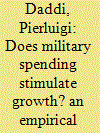

|
|
|
|
|
| Summary/Abstract |
This paper investigates the effect of military burden on economic growth and extends previous works on the optimal size of government expenditure by exploring how external threat affects the preferences of the households and, in turn, economic growth. Post World War II Italian data are used to estimate nonlinear growth models using time-series semi-parametric methods. The estimates show that total government and civilian burdens are productive, whereas, military burden has significant effects on economic growth through the expenditure for peacekeeping missions, which reduces the insecurity in the home country. This may justify economically the current not negligible budget devoted to peacekeeping and humanitarian missions.
|
|
|
|
|
|
|
|
|
|
|
|
|
|
|
|
| 2 |
ID:
160212
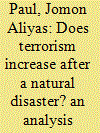

|
|
|
|
|
| Summary/Abstract |
Does an emergency such as a natural disaster lead to a surge of terrorism? This paper contributes to the emerging literature on this issue. We consider the experience of 129 countries during the period 1998–2012 to determine the effect of a natural disaster on both domestic as well as transnational terrorism. We also control for endogeneity using expenditure on health care and land area in a country as instruments. In contrast to the existing literature, we measure the extent of terrorism by the value of property damage. The results indicate that after natural disasters, (a) transnational terrorism increases with a lag, and (b) a statistically significant impact on domestic terrorism is not observed.
|
|
|
|
|
|
|
|
|
|
|
|
|
|
|
|
| 3 |
ID:
160214
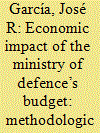

|
|
|
|
|
| Summary/Abstract |
This article analyses the economic impact of the expenditure budget of the Spanish Ministry of Defence (MoD) and its Autonomous Agencies (AA), distinguishing direct, indirect and induced effects. The input–output methodology is used to find intersectoral effects on the rest of the economy. The article quantifies the economic impact in terms of production, gross value added (GVA), employed population, tax revenue, and also in terms of its contribution to the gross domestic product (GDP) of Spain in 2010. The results show that the activity of the MoD and AA generates 1.2% of the country’s GDP and 1.7% of total employment in that year.
|
|
|
|
|
|
|
|
|
|
|
|
|
|
|
|
| 4 |
ID:
160211
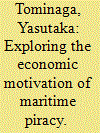

|
|
|
|
|
| Summary/Abstract |
This paper presents two hypotheses regarding the relationship between marine fisheries and maritime piracy. These hypotheses are based on the opportunity and willingness framework and describe how fish values and production can drive fishermen to engage in illegal activities, and the mechanisms that their capabilities and choices make available to them stipulate the forms that piracy takes when facing a declining fishing economy. The hypotheses are tested with the Maritime Piracy Data (MPD) using the negative binomial regression and the bivariate Poisson model. This study uses the instrumental variable approach to deal with endogeneity through two instruments: chlorophyll concentrations and temperature. The statistical analysis shows that unsophisticated piracy attacks are sensitive to fish production, but sophisticated attacks can be affected by both fish production and fish values and depend on the opportunity cost of existing fisheries and finding work in other industries.
|
|
|
|
|
|
|
|
|
|
|
|
|
|
|
|
| 5 |
ID:
160209
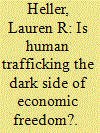

|
|
|
|
|
| Summary/Abstract |
Economic freedom has increased living standards worldwide. Concurrent with such gains are rising concerns about potential human costs associated with free markets. This paper uses data on human trafficking and anti-trafficking policies, in conjunction with a measure of economic freedom, to examine whether free markets exacerbate or attenuate the incidence of human trafficking and policies designed to combat it. We do not find evidence suggesting that economic freedom is associated with human trafficking. In addition, our results suggest that economically free countries are more likely to enact and enforce policies to fight human trafficking.
|
|
|
|
|
|
|
|
|
|
|
|
|
|
|
|